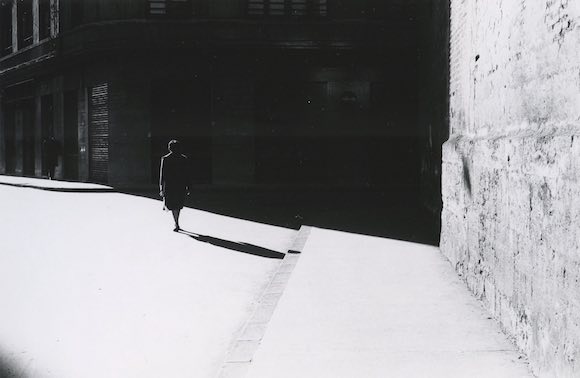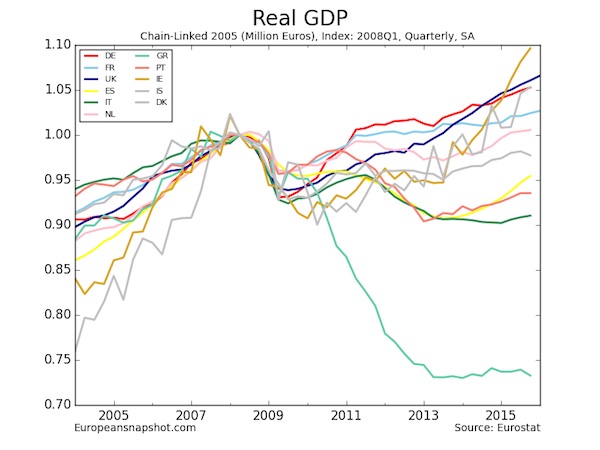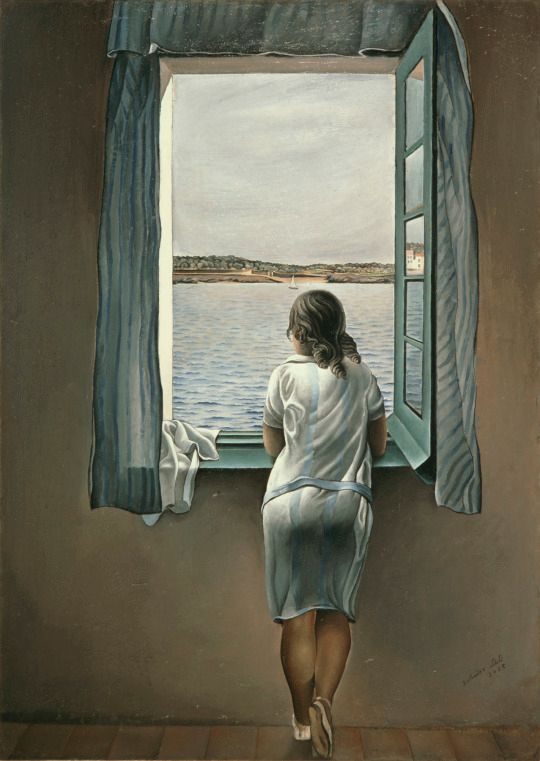
Ray K. Metzker Europe 1961
The true face of the EU is presently on display in Greece, not in Germany or Holland or France. Brussels must first fix what’s going wrong in Athens and the Aegean, and there’s a lot going wrong, before it can move on towards the future, indeed towards any future at all. It has a very tough job in Italy as well, which it’s trying hard to ignore.
You can’t say ‘things are fine in Germany’ or ‘Finland is recovering’ and leave it at that. Not when you’re part of a political -and to a large degree also economic- Union, let alone when you’re preaching tightening -and deepening- that Union. Not when parts of that Union are not only doing much worse than others, but are being thoroughly gutted. Then again, they’re being gutted by the very Union itself, so Brussels -and Berlin, The Hague, Paris- can’t very well feign surprise or deny responsibility.
Of course the European continent needs a ‘body’, some form of organization -and it needs it badly- that will allow its nations to cooperate, in 1000 different ways and fields, but the EU is not it. The EU is toxic. It is turning nations against each other as we speak. So much so that it’s crucial for these nations to leave the union and dismantle the entire operation before that happens, because there will be no opportunity left to do it once the toxicity takes over. The UK should count itself lucky for getting out while it did.
In its present setting, the EU has no future. And, more importantly, there is no mechanism available to change that setting. It should have been insisted on when the Union was founded, or in one of its various treaties after. This never happened, though, and that’s no coincidence, it was always about power. It’s therefore very hard -if not impossible- to see how the EU could be altered in such a way that it has a chance of survival.
Changing or tweaking a few rules is not going to do it. It’s the very Brussels power structure that is inherently faulty, and those parties that under this structure have the power, are the same ones who would have to change it (against their own interests). There is not a single decision concerning important -for instance economic- EU policies that can be taken against the wishes of Berlin. And Berlin demands what’s good for Germany, even if that is bad for other member states.
In order to save the EU, German representatives would have to vote against their own national interests. But they were elected specifically to protect those interests. There is no better way to illustrate the fatal flaw in the -construction of- the EU. Politicians are elected to protect the interests of their member states, and no member state can possibly prevail but Germany, because it’s the biggest. You can put any label you want on that, but democratic it’s not.
Germany and Holland are doing great, according to the most recent economic data. But how is that a reason to celebrate when Greece and Italy, among others, are not doing great at all? Why the difference? It’s not because they spend their money on “Schnaps und Frauen” as Eurogroup president and Dutch demissionary FinMin Dijsselbloem so poetically suggested.
It’s because the Eurogroup has not acted in their best interests. Because when their interests differed from the Dutch and German ones, the latter won out. Easily. And they always will under the present terms. As head of the Eurogroup, Dijsselbloem should represent the best interests of all member nations, not just Holland and Germany.
So should Angela Merkel as the de facto head of the EU. And it’s a very simple fact, easy to explain as well, that these interests can conflict. Obviously, that Merkel can call all the important shots in the EU should be a red, flashing, blinding and deafening alarm sign to start with. Germany should have taken a step back, back in 1960 or so, or even 1999, but for obvious reasons didn’t, and got away with that. It’s about power, it was never about Union other than to increase Power.
European politicians have not been able to make the ‘shift’ from nation to Union. Once they are faced with decisions that may harm their national interests, but benefit those of the EU as a whole, they must revert back, by default, to their own respective nationalistic priorities. Even if they are the ones who complain loudest about rising nationalism and protectionism.
And they’re -kind of- right, or justifiable. German, French, Dutch politicians are not accountable to Slovakian or Slovenian interests. That’s just extra, nice if it happens to coincide with what Berlin or Paris want, but not a priority in any sense of the word. Understandable, but lethal to the idea of a Union.

There is your fatal EU flaw. The whole common interest idea is just a sales pitch, always was. Which worked fine in times of growth. But take a look now. There’s nothing left. The rich north has used the poorer south to transfer its losses to. It’s not a union, it’s old-fashioned colonialism.
Europe’s political problem can perhaps best be expressed by comparing it to the US. Germany, plus to a lesser extent Holland, and France, have so much power that it would be like California and New York could call all important shots in America. But they can’t. Trump’s election shows that they cannot. Europe doesn’t even have that escape valve.
Delving a bit deeper, Kansas and California may be different cultures, but their people speak the same language, they watch the same TV shows, read the same news. Different cultures, but also part of the same culture. In Europe, most people have no idea who EU head Juncker is, or care, or how he got where he’s at.
Most likely know who Angela Merkel is, but they don’t know that she takes all the important decisions about their lives now. If they did, the pitchforks would be out in minutes. Luckily for Merkel, the EU is as opaque as can be,
90% of Europeans need subtitles to understand Juncker and Merkel. Or for some journalist to translate for them. Everyone in Kansas and California understands what Trump says, no matter how confused he may sound or what they may think of him. He’s American, and so are they. He’s one of them.
Needing subtitles to understand Juncker and Merkel may work in times of plenty. But in lean years, people don’t take kindly to that kind of thing, that someone you can’t even understand, and that you can’t hold to account, makes important decisions that impact you directly, as you see your jobs and savings and homes vanish and the future of your kids disappear.
That is asking for trouble. The EU has that trouble, and it will have much more of it. The only way out of that trouble is for the Union to dismantle itself. But as we can see in the whole Brexit story, that would involve so many interested parties giving up on so many perks that feed them, politicians, businesses, what have you, that none of it would ever happen voluntarily.
The EU has become a farcically intricate web of policies and laws and regulations, all built on fatally flawed foundations, that no citizen of sound mind feels connected with. The only way out of that is to literally get out. The UK got it right, whether they meant it or not.
The EU cannot be reformed because the only people -and the countries they represent- who could do the reforming, profit hugely from the present state of affairs, from not reforming. Fatal. Flaw.
As any builder can tell you who’s ever seen a structure on the verge of collapse: some can be saved and some of them you just have to let go. Raze ’em and start from scratch. Which in many cases, as builders know, is simply the best choice.
Please don’t get me wrong: of course there are tons of things the EU has done that are great, and right, and all that. But it’s the power structure that will inevitably kill it no matter what else it does that actually works. And that structure is beyond redemption.









